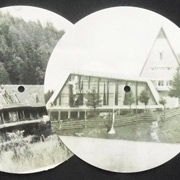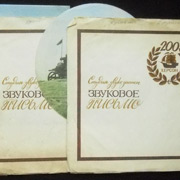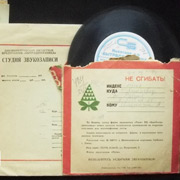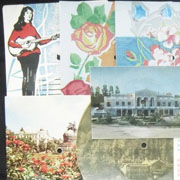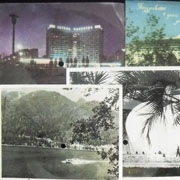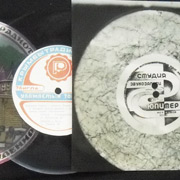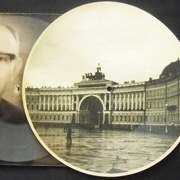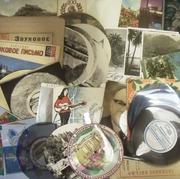I guess, resorts of USSR South were the origin of audioletters idea.
There far away from Kremlin neversleeping eye both ideological and Penal Code borders were not so rigid as in capitals, so it made possible some things that we could name a private business nowadays.
While more unassuming merchants used to sell churchkhela on a beach, and lucky ones made photographs of comarades vacationists under palms, those who arrived too late to that feast of life have been forced to explore wilderness to stake a claim, to escape from poor looser's fate and do not live paycheck to paycheck. So some technically advanced head gave birth to idea of beautiful service: to record one's voice onto record with image of local sights.
Surely, at the times when any money earnt besides the only allowed places where work-book of a citizen of the country "where a man can breathe so freely" has been kept were labeled as "unearned income" and could be punished with a prison term, any superfluous enthusiasm in money earning should be well masked. Businessmen starving for freedom of sphere of small but profitable services used to crowd behind some legitimate screens like "Рublic service centers". Custom sound recording wasn't an exception for sure.
The service become popular immediately since there weren't anything closer to soviet men than a chance to cut down their near ones. So flied the special envelops carrying cheerful voices of vacationers and business travellers backgrounded with a deafening sights of Kaucasus peaks, luxurious sanatoriums and wonder-working Narzan springs to sddresses of friends and colleagues, who vegetated drearily in eternal nothern semi-season.
More refined service could be offered sometimes: record with your own image could be ordered instead of Pitsunda pines covered mountain slopes or Bzyb river view.
But business rules were valid even in 1950s Gagra. It became clear soon, that record with image of customer wasn't comfortable for both customer and manufacturer, making first to wait more, and making the second one to do piece goods instead of batch-produced ones, even if it's been better paid for.
It's turn out also, that many people prefer to send to their relatives not a symbolic regards for very non-symbolic money but something more useful, like a song. It was extremely handy for records manufacturers. No necessity to treat each person in studio, recording his verbal colics plus absence of any copyright law made audio goods unification to reach optimum and ability for uncontrolled profit to reach it's apogee since impersonal service made impossible to control what, where and when were recorded and then sold.
Handicraft recording units appeared in USSR following elements supply developing. If in mid-1920s news events of the scanty soviet radio press were such an alamort events like beginning of manufacturing of electrical clamps in city A or luck of electrical wire in village B, in 1930s the things went better. Amateur radio hobby from marginal (and prodigal - radiocomponents were not scarce only, but very expensive, too) madness turn to mass hobby category, reaching national mania level on highlights like big air flights or Chelyuskin epopee, when everybody unless deaf and dumb invalid who couldn't take a solder dreamt to hear, pressing close to self-made radio, through air crackle, call-sign of Ernst Krenkel.
So along with schematics of receivers, Nipkow disc mechanic TV design and reports about revealed and crashed saboteurs, who, wormed their ways into
closed ranks of soviet short-wave enthusiasts, entered unnatural relations with German radio-amateurs, in "Radiofront" magazine could be found also units for tape or record mechanical audio recording.
In the country where one skilled craftsman with a file was able (and compeled!) to substitute an entire branches, manufacturing of do-it-yourself records recording equipment made no problem. They have been crafted "from scratch", made of rebuilt seismographs; I was told, some have beed bought from abroad.
By the 1970s this pleasant and profitable business spread fare behind resorts origin - "audio recording studios" appeared in any noteworthy town, and assortment shifted more and more towards pre-recorded music. Voice recording was still available but demand for this kind of service was falling swiftly. First soviet portable cassette recorder "Desna" appeared in 1969, a year later on Kiev military plant "Communist" (that passed way from automatic device for strewing of nails to heels nailing maching in 1930 to wide range of radar equipment in 1950s-1960s) has been developed father of cassette tape-recorders generation "Vesna-305" (at the same time special needs spy wire recorder "Meson" was in developing). In 1972 a range of portable recorders hit the market: "Vesna-306", "Electronica 301", "Sputnik-401", "Legenda-401" and some others. So began times of new handy, capacious, relatively high quality media - compact cassette.
Newertheless demand on primitive records remained high, because factory records assortment in music shops has been blown away swiftly with each mile away from capitals, modern popular music was represented unsatisfactorily on Melodya records and always with a 1-2 years delay. Tape recorders remain extremely expensive - on the level of 2 months salary of a regular working man, but
at least some sort of old turntable was virtually in any family.
I cought handicraft records epoch in late 1970s - early 1980s, when it was a spent bullet. In the town in Ukraine where I lived I used to run during the long break down to the newspaper kiosk in the River port not far from school, where not less than one third, if not a half of all horizontal space was occupied with the records of local "audio recording studio" featured town sights. They were quite pricey, but nevertheless from time to time I used to buy some flexi like Boney-M "Fly to Venus" with shamelessly abridged beginning and end and played it at home on antique tube wreck turntable "Volga".
I used to visit the recording studio itself later, in 1983-1984 - to record some music on tape. There was a list on the wall with about a hundred of available albums. Seditious items like Pink Floyd (for "Brezhnev took Afghanistan. Begin took Beirut."), Julio Iglesias ("neofascism") or Donna Summer ("erotism") were striked-out, they were "prohibited". Though I suspected that those who asked good enogh could get them recorded, too. Either I asked not good enough or I was insufficiently trusted customer but my request for prohibited "Scorpions" has been declined. There was a couple of flexi discs recording devices in a separate room. I've never seen them standing idle.
